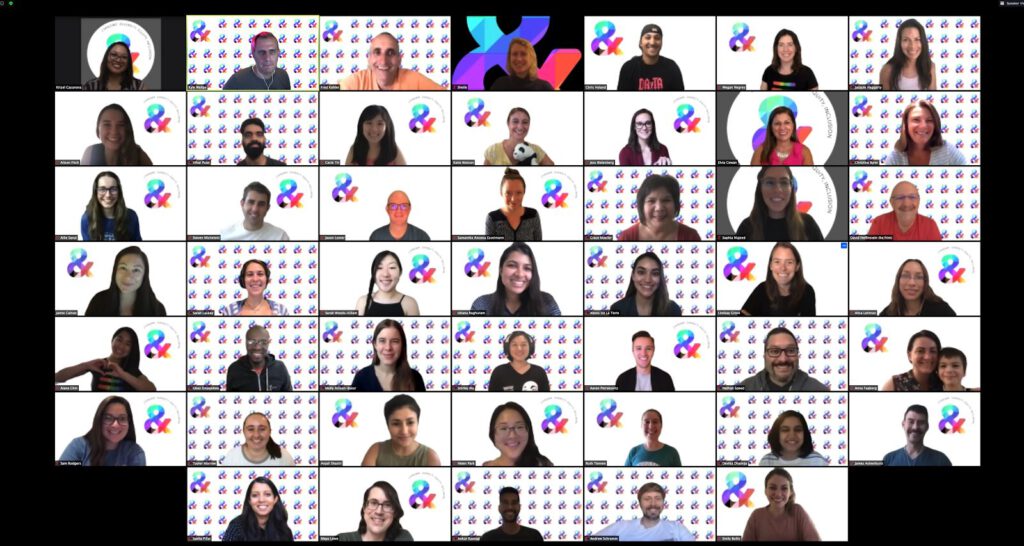Last June, following the tragic deaths of George Floyd and so many others in the Black community, our CEO pledged to hold ourselves accountable to make improvements to ensure our people, products, and practices are more diverse, equitable, and inclusive.
Today, we wanted to share some of the steps we’ve started to take.

Established clear Diversity, Equity & Inclusion (DEI) focus areas
In order for us to have a clear understanding of the areas where we can best focus our efforts, we conducted an in-depth audit from 2019 through 2020, which included data and feedback from the following sources:
- Discussions with current and former Black employees
- Employee exit survey feedback
- Reviewed hiring data, looking at ethnic and gender diversity
- Company-wide employee engagement survey responses
- Past and current workforce demographics
- An audit conducted by Mathison, an organization focused on hiring diverse talent
Based on the findings of this audit, we were able to identify four key company focus areas:
- Hiring: Attract and hire top, diverse talent.
- Employee Experience: Cultivate an inclusive environment that authentically celebrates our shared genome and unique differences.
- Product & Research: Use our product to build and sustain DEI in every customer and community interaction.
- Community Impact: Use our relationships to build diverse, equitable, and inclusive communities.
Our approach is to ensure DEI is the foundation of how 23andMe fundamentally operates—it’s not an afterthought or a separate side effort. We have set clear goals, codified each of these four focus areas in our annual company strategy, and will measure how well we’re making progress quarterly.

Additional efforts aimed at improving DEI
Although we’ve primarily been working on establishing clear company focus areas, we have made good progress in some workplace, research, product, and community efforts over the past three months. Specifically, the company:
- Hosted a company-wide Pride event to celebrate our employees and to educate allies
- Became a Founding Partner for iHeart Radio’s BIN: Black Information Network, the first and only national and local news audio service dedicated to providing an objective, accurate, and trusted source of continual news coverage with a Black voice and perspective
- Began to build a more diverse leadership team by welcoming L. Okey Onyejekwe Jr., MD & JD, as 23andMe’s Vice President of Healthcare Operations & Medical Affairs
- Published research detailing one of the most comprehensive investigations of the transatlantic slave trade ever done, based on genetic data from close to 50,000 people
- Launched a new Genetic Health Risk report on APOL1-related chronic kidney disease*, which has particular relevance for customers with African ancestry
- Through our COVID-19 research study, we were able to identify racial and ethnic disparities in the impact of COVID-19
- Joined SurveyMonkey’s new initiative to audit and track the diversity, equity, and inclusion practices of our vendors and service providers
- Implemented enhancements to our HR systems to better track more dimensions of diversity and reduce bias in the candidate application process
Engaging employees across the company
Since kicking off our concerted DEI efforts, 23andMe employees have truly come together to volunteer their time and energy to create a better workplace and improve our product and community efforts.
We now have 96 active employee resource group members devoted to DEI, 23andWe. And nearly 290 employees, roughly 51% of our workforce, have joined our company Slack channel #diversity, where we discuss and share interesting articles, videos, and resources.
We believe progress can only come if all employees are motivated and engaged to drive positive change.
Continuing down the DEI path
While we’ve just started on this journey, we are encouraged by the enthusiasm of our employees. Please stay tuned as we continue to share the latest updates and news of our commitment to improving diversity, equity, and inclusion across our company, product, and community.
*The 23andMe PGS test uses qualitative genotyping to detect select clinically relevant variants in the genomic DNA of adults from saliva to report and interpret genetic health risks. It is not intended to diagnose any disease. Your ethnicity may affect the relevance of each report and how your genetic health risk results are interpreted. Each genetic health risk report describes if a person has variants associated with a higher risk of developing a disease but does not describe a person’s overall risk of developing the disease. The test is not intended to tell you anything about your current state of health or to be used to make medical decisions, including whether or not you should take a medication, how much of a medication you should take, or determine any treatment. The Chronic Kidney Disease (APOL1-Related) genetic health risk report (i) is indicated for reporting the S342G and N388_Y389del variants in the APOL1 gene, which define the G1 and G2 haplotypes, respectively, and (ii) describes if a person has variants associated with an increased risk of developing chronic kidney disease. The variants included in this report are the most common and best studied in people of African descent.



